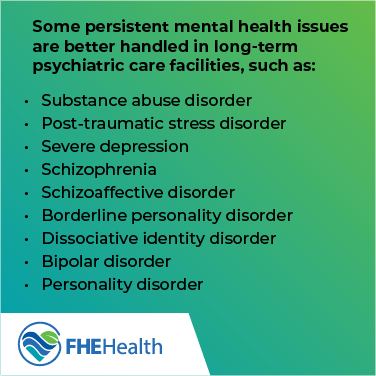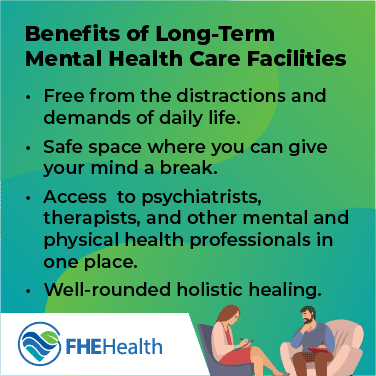
Mental health is an important but often neglected aspect of life. Over 20 percent of Americans live with a mental illness, and many need ongoing mental health services.
For those living with severe or chronic mental illness conditions, long-term mental health care offers the support and resources necessary to thrive. From helping individuals develop the life skills and coping strategies they need to navigate ongoing mental health challenges to providing treatment for co-occurring disorders, this comprehensive approach ensures individuals receive continuous personalized care.
Long-term mental health care can be essential for a variety of people, including:
- Those with severe chronic mental illnesses, including bipolar disorder, schizophrenia, and major depressive disorders
- Those living with persistent or severe anxiety that impacts their ability to function
- Trauma survivors
- People with substance use disorders
To address these needs, there are several long-term mental health care options available. Below, we explore these options and look at common issues that people who need ongoing mental health services experience.
Understanding Long-Term Mental Health Care
Long-term mental health care offers continuous, comprehensive support to those living with severe or chronic mental health conditions. Through this form of individualized treatment, individuals get help with managing their symptoms, building social and life skills, and achieving improved well-being.
Short-term stays at a mental health facility are often useful for mitigating emergencies, including scenarios where an individual is a threat to themself or others. These stays provide a break for the mind and help stabilize thoughts, feelings, and behavior. However, short-term care may not allow enough time to explore trauma and develop adequate coping mechanisms. Once the individual is back out in the world, they may be unable to properly identify their triggers and deal with them in a healthy way. 
Long-term psychiatric care helps individuals navigate the distractions and demands of daily life. It provides an opportunity for individuals to actively work on bettering their mental health.
Common mental health conditions that may require long-term care include:
- Substance abuse disorder
- Post-traumatic stress disorder
- Severe depression
- Schizophrenia
- Schizoaffective disorder
- Borderline personality disorder
- Dissociative identity disorder
- Bipolar disorder
- Personality disorder
Types of Long-Term Mental Health Care Facilities
There are several types of long-term mental health care facilities, accommodating a range of needs and preferences. An FHE admissions counselor can help you or a loved one compare available options. 
Residential Treatment Centers
Residential care treatment centers are specialized facilities where individuals live and receive comprehensive mental health care services. These centers provide a diverse range of services, including addiction treatment, individual and group counseling, neuro-rehabilitative services, and health, wellness and nutrition support.
Residential treatment centers treat a range of conditions, including substance use disorders, mental illnesses, and co-occurring disorders for those with complex mental health needs.
This long-term treatment option requires individuals to live separately from their families for weeks or months, and it often takes time to adjust to the structured environment and daily routines. However, it offers numerous benefits, including 24-hour support, comprehensive treatment, and a strong focus on recovery and wellness.
While residential treatment centers such as FHE accept many major health insurance plans, not all centers accept insurance. For that reason, the cost of care can be prohibitive for some.
Psychiatric Hospitals and Long-Term Inpatient Facilities
Psychiatric hospitals are specialized medical facilities that provide inpatient care for individuals with acute psychiatric symptoms. They typically administer short-term, intensive treatment for those experiencing mental health crises.
Long-term inpatient facilities offer a similar level of intensive care, but they accommodate those who have severe mental health conditions that require prolonged stabilization. In both settings, patients are admitted through emergency rooms or referrals from mental health professionals, and their stay may or may not be voluntary.
Many psychiatric hospitals and long-term inpatient facilities accept health insurance. However, the cost of treatment depends heavily on the hospital and the type of insurance a patient has.
Community Mental Health Centers
Community mental health centers are local nonprofit clinics that provide mental health care services to underserved communities. These facilities often work with other community organizations, including schools and health care providers, to offer holistic support to their clients. They treat a wide range of mental health conditions, including depression, anxiety, post-traumatic stress disorder, and substance use disorders.
Community mental health clinics focus on providing mental health services to those who might not have access to other options. In many cases, they use sliding fee scales to offer affordable care. However, they often rely on government grants and community donations, which can be insufficient. For that reason, they’re often unable to provide the specialized or advanced treatment options available through other mental health care providers.
Outpatient Programs and Partial Hospitalization
Outpatient programs and partial hospitalization programs provide intensive mental health services while allowing patients to live in their regular environments. These programs vary in intensity, providing individualized treatment based on where someone is in their recovery journey.
- Partial hospitalization programs: PHPs are a step down from inpatient treatment. With this option, individuals engage in recovery activities 25-30 hours per week.
- Intensive outpatient programs: IOPs typically include around 15 hours per week of programming, offering greater flexibility than inpatient treatment and PHPs.
- Sober living houses: These offer a transitional environment for individuals who have completed an inpatient treatment program but are not yet ready or able to return to their home environments. Sober living houses provide a supportive and structured environment to help individuals maintain their recovery.

Long-Term Therapy
Long-term therapy involves regular therapy sessions over an extended period of time. While regular therapy typically follows a structured framework, lasts for a specific time period, and focuses on addressing immediate issues, long-term therapy is open-ended.
Clients work with their therapists to explore emotional or psychological issues over months or even years, addressing behavioral patterns, personality disorders, and traumatic experiences. Depending on their preferences, they may attend sessions in person or find a teletherapist with relevant experience or areas of concentration.
Choosing the Right Long-Term Mental Health Care Option
When choosing the right long-term mental health care option, there are several factors to consider, including the nature of the mental health issue and access to financial resources.
Some factors to consider include:
- Severity of the condition. Determine whether the mental health condition is acute or chronic. Acute conditions may benefit from residential or intensive outpatient treatment, while chronic conditions might be better managed with ongoing outpatient therapy.
- Cost. Consider the cost of the treatment you want and assess your budget. Look into financial assistance programs, sliding fee scales and community resources that may help you manage costs.
- Insurance coverage. Find out what mental health services your health insurance plan covers, including the types of therapy it pays for, medication, and inpatient and outpatient treatment.
It’s also important to accurately assess the quality of care a facility or mental health care provider offers. Consider whether a therapist has the credentials relevant to your mental health challenges, and look at a residential treatment facility’s affiliations and accreditations. Look for certifications from reputable organizations and seek out patient reviews and testimonials.
Resources for Ongoing Support
Navigating mental health challenges is a lifelong journey for many people, and having access to supportive resources can make a significant difference. Helpful resources include:
- 988 Suicide & Crisis Lifeline: Provides 24-hour, free and confidential support for individuals in mental distress.
- Crisis Text Line: Text HOME to 741741 for free around-the-clock support during a mental health crisis.
- SAMHSA Directory: Maintains a comprehensive list of mental health care providers in each state.
- National Alliance on Mental Illness: Offers education, support and advocacy for individuals and families affected by mental illness, and provides information on local support groups and resources.
- The Trevor Project: A crisis intervention and suicide prevention service for youth in the LGBTQ+ community.
Conclusion
There are numerous long-term mental health care options, from intensive inpatient settings to ongoing therapy sessions. Understanding the best option for your mental health needs and goals can significantly improve your quality of life.
FHE Health provides different levels of care for a range of mental health issues. Our live-in mental health facilities are located on a five-acre campus, providing a conducive environment for mental health progress. FHE professionals are always ready to walk with you on the journey back to a healthy mental state. You can call us anytime to speak to a counselor about staying at our long-term mental health care facilities.






